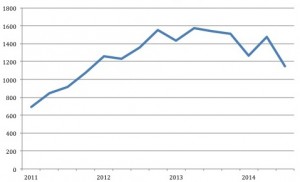Go Lean Commentary
 The book Go Lean…Caribbean describes a new regime for Caribbean economic circles: a world where most payments are conducted via electronic means. While this may be the future for the Caribbean, frankly it is already the reality for North America and Western Europe!
The book Go Lean…Caribbean describes a new regime for Caribbean economic circles: a world where most payments are conducted via electronic means. While this may be the future for the Caribbean, frankly it is already the reality for North America and Western Europe!
In the Caribbean, we are behind the times; we party like its 1969!
Electronic Payments schemes are no longer optional. These must be deployed, as soon as possible, to forge the change necessary to elevate Caribbean society. The trend has started; see the news article here of a card payment scheme deployed recently in the Bahamas:
Title: More Than 4,000 Residents Now Using Social Services Debit Card
By: Ricardo Wells, Staff Reporter, The Tribune – Bahamas Daily Newspaper – Posted 05/19/2015; retrieved 06/24/2015 from: http://www.tribune242.com/news/2015/may/19/more-4000-residents-now-using-social-services-debi/MORE than 4,000 residents of New Providence are now part of the Department of Social Services’ modernised food assistance programme.
Officials announced yesterday the approval of an extra 1,501 clients from the Horseshoe Drive Centre to the programme, joining 780 clients registered at the Wulff Road Centre, 874 at the Fox Hill Centre and 1,660 at the Robinson Road Centre, bringing the total to 4,365 in possession of the new pre-paid debit card.
Social Services Minister Melanie Griffin said that although the new pre-paid cards do not resolve all of the issues and problems that exist in the department’s food programme, they allow “clients that are truly in need the ability to shop and purchase needed food items with ease and comfort”.
Mrs Griffin explained that the cards provide users with the ability to not only to limit their contact with centres, but gives them more freedom by allowing them to determine how much they spend in one location and the ability to shop at different establishments in one payment period.
According to the Yamacraw representative, all three are features not allowed by the previous voucher system operated by the department.
“It was a long, hard road getting to this point but with the addition of each centre, we gained more experience and improved the processes involved,” said Mrs Griffin.
She added: “We now turn our efforts to the introduction of the card in Grand Bahama and the FamilyIslands as we intend for this payment method to be utilised throughout the Bahamas.”
Officials from the department indicated that the implementation process is already under way in Grand Bahama with people registered for assistance now being reassessed.
The department suggested that the new cards would first be issued at the Eight Mile Rock Centre and then throughout Freeport.
In November, officials introduced the new debit card in conjunction with Bank of The Bahamas (BOB).
It is designed to curb abuse of the food coupon system, and is seen as a key reform to how the government distributes aid to poor Bahamians.
Mrs Griffin said last year that the card was one feature of wide-ranging upgrades to the Bahamas’ social safety net, a programme being financed with $7.5m from the Inter-American Development Bank (IDB).
In January, the government had approved a five per cent increase in the Department of Social Services’ food assistance budget to counteract the impact of VAT on the poor.
Last June, the Department of Statistics said that since 2001, poverty levels in The Bahamas have risen by 3.5 per cent, while more than 40,000 people in the country live below the poverty line – defined as an annual income of less than $5,000 a year.
Other examples abound. The Go Lean book (Page 353) identifies the system deployed in American states and territories (including Puerto Rico and the US Virgin Islands) branded EBT (Electronic Benefits Technology).
We must therefore examine models used around the world to facilitate these payment systems. The Go Lean book specifically draws attention to the model of the Mastercard/Visa Interchange and Clearinghouse; (Page 172). The book serves as a roadmap for the introduction and implementation of the Caribbean Union Trade Federation (CU) and the Caribbean Central Bank (CCB). This Go Lean roadmap has 3 prime directives:
- Optimization of the economic engines in order to grow the regional economy to $800 Billion & create 2.2 million new jobs.
- Establishment of a security apparatus to protect the resultant economic engines.
- Improvement of Caribbean governance to support these engines.
This Go Lean/CU/CCB roadmap defines that despite coins and notes, the regional currency, the Caribbean Dollar (C$), will be heavily-targeted as a cashless currency. So the CCB will settle all C$ electronic transactions in the style of the MasterCard-Visa Interchange & Clearinghouse. See the definition in the Appendix below. The book relates (Page 172) how this activity would be a fundamental revenue source for Caribbean governance; as the Mastercard/Visa model now enjoys interchange and clearance fees in excess of 1% – 2% of transaction amounts; (pricing is based on different transaction/industry/card types + flat fees). The Appendix summarizes total revenue for a recent year at $30 Billion for US operations alone. Yes, the pennies add up!
(The latest Visa Bankcard Acquiring fees, effective 16 April 2015, are detailed here on their website: http://usa.visa.com/download/merchants/Visa-USA-Interchange-Reimbursement-Fees-2015-April-18.pdf)
According to the foregoing news article, why would the Bahamas government pay interchange fees to the American entity that is the Mastercard/Visa clearinghouse. The money on deposit originates in the Bahamas, the currency is Bahamian Dollars and the merchants are Bahamian. Why is there a need to share the transaction revenue outside the border with an American entity?
This reeks of Crony-Capitalism!
This subject and application vividly depicts the need for a local Caribbean solution of the technology and processing for card transaction interchange. This is the quest of the Go Lean…Caribbean roadmap.
However, this issue is about more than just technology, it relates to economics as well. A previous blog/commentary related how electronic payments provide the impetus for M1, the economic measurement of currency/money in circulation (M0) plus overnight bank deposits. A mission of Go Lean is to increase M1 values, thereby facilitating the dynamic called the “money multiplier” – creating money “from thin-air”. This is a BIG deal!
The Go Lean/CU/CCB movement declares: “Move Over Mastercard/Visa!”
We must model the Mastercard/Visa clearinghouse and learn lessons from their good, bad and ugly history.
It is argued that this interchange is classic Crony-Capitalism, the use of the public trust for the pursuit of private profits. This is evident with their monopolistic integration of bankcard processing despite being two separate for-profit entities (association/ cooperative of banks). This is a familiar charge against this clearinghouse; they have been constantly accused of these abusive practices:
Price-fixing
Regulators in several countries have questioned the collective determination of interchange rates and fees as potential examples of price-fixing. Merchant groups in particular, including the U.S.-based Merchants Payments Coalition and Merchant Bill of Rights, also claim that interchange fees are much higher than necessary,[14] pointing to the fact that even though technology and efficiency have improved, interchange fees have more than doubled in the last 10 years. Issuing banks argue that reduced interchange fees would result in increased costs for cardholders, and reduce their ability to satisfy rewards on cards already issued.Consumer welfare
A 2010 public policy study conducted by the Federal Reserve concluded the reward program aspect of interchange fees results in a non-trivial monetary transfer from low-income to high-income households. Reducing merchant fees and card rewards would likely increase consumer welfare.[15]
The Merchants Payments Coalition is fighting for a more competitive and transparent card fee system that better serves American consumers and merchants alike. Because swipe fees are hidden, consumers are unable to weigh the benefits and costs associated with choosing a particular form of payment. Eliminating hidden swipe fees is advocated as a means to realize an open market system for electronic payments.[16]
Creating the optimized CU/CCB governance is “Step One, Day One” in the Go Lean roadmap. The strategy is to implement the CCB and C$ currency with a regulatory framework fortified by best-practices, technology and infrastructure, to facilitate the electronic payments needs of the Caribbean community.
The roadmap posits that to adapt and thrive in the new global marketplace there must be more strenuous management, technocratic optimizations, of the region’s governance … and payment systems. This is the charge of Go Lean roadmap, opening with the Declaration of Interdependence (Page 12 – 13) and these pronouncements:
xi. Whereas all men are entitled to the benefits of good governance in a free society, “new guards” must be enacted to dissuade the emergence of incompetence, corruption, nepotism and cronyism at the peril of the people’s best interest. The Federation must guarantee the executions of a social contract between government and the governed.
xii. Whereas the legacy in recent times in individual states may be that of ineffectual governance with no redress to higher authority, the accedence of this Federation will ensure accountability and escalation of the human and civil rights of the people for good governance, justice assurances, due process and the rule of law…
xxiv. Whereas a free market economy can be induced and spurred for continuous progress, the Federation must install the controls to better manage aspects of the economy: jobs, inflation, savings rate, investments and other economic principles. Thereby attracting direct foreign investment because of the stability and vibrancy of our economy.
xxv. Whereas the legacy of international democracies had been imperiled due to a global financial crisis, the structure of the Federation must allow for financial stability and assurance of the Federation’s institutions. To mandate the economic vibrancy of the region, monetary and fiscal controls and policies must be incorporated as proactive and reactive measures. These measures must address threats against the financial integrity of the Federation and of the member-states.
The foregoing article, demonstrates that this region is ready for a local payment-card clearinghouse solution. The Go Lean book details a series of community ethos, strategies, tactics, implementations and advocacies to foster the proper controls for electronic payments/virtual money in the Caribbean region:
| Community Ethos – Economic Principles | Page 21 |
| Community Ethos – Money Multiplier Principle | Page 22 |
| Community Ethos – “Light Up the Dark Places” | Page 23 |
| Community Ethos – Lean Operations | Page 24 |
| Community Ethos – Cooperatives | Page 25 |
| Community Ethos – Ways to Impact the Future | Page 26 |
| Community Ethos – Promote Intellectual Property | Page 29 |
| Community Ethos – Ways to Bridge the Digital Divide | Page 31 |
| Tactical – Separation of Powers – Central Banking | Page 73 |
| Implementation – Assemble Central Bank Cooperative | Page 96 |
| Implementation – Ways to Deliver | Page 109 |
| Implementation – Ways to Impact Social Media | Page 111 |
| Planning – 10 Big Ideas – Currency Union / Single Currency | Page 127 |
| Planning – Ways to Improve Interstate Commerce | Page 129 |
| Anecdote – Caribbean Currencies | Page 149 |
| Advocacy – Ways to Mitigate Black Markets – e-Payments | Page 165 |
| Advocacy – Government Revenue Options – Interchange Fees | Page 172 |
| Advocacy – Ways to Foster Cooperatives – Cooperative Banking | Page 176 |
| Advocacy – Ways to Impact Cruise Tourism – Smartcard scheme | Page 193 |
| Advocacy – Ways to Foster Technology – e-Government Services | Page 197 |
| Advocacy – Ways to Foster e-Commerce – Card Culture | Page 198 |
| Advocacy – Reforms for Banking Regulations – Credit Card Banking | Page 199 |
| Appendix – Alternative Remittance Modes – Prepaid Card Option | Page 270 |
| Appendix – Electronic Benefits Transfers in the Caribbean Region | Page 353 |
The points of effective, technocratic payment system stewardship, were further elaborated upon in these previous blog/commentaries:
| https://goleancaribbean.com/blog/?p=5542 | Economic Principle: Bad Ethos of Rent-Seeking – Something for nothing |
| https://goleancaribbean.com/blog/?p=4425 | Cash, Credit or iPhone … |
| https://goleancaribbean.com/blog/?p=3889 | RBC EZPay – Ready for Change |
| https://goleancaribbean.com/blog/?p=3617 | Bahamas roll-out of VAT leading more to Black Markets |
| https://goleancaribbean.com/blog/?p=2074 | MetroCard – Model for the Caribbean Dollar |
| https://goleancaribbean.com/blog/?p=1350 | PayPal expands payment services to 10 markets |
| https://goleancaribbean.com/blog/?p=906 | Bitcoin virtual currency needs regulatory framework to change image |
| https://goleancaribbean.com/blog/?p=833 | One currency, divergent economies |
Now is the time for all of the Caribbean, the people, the banking establishments and governing institutions, to lean-in for the empowerments described in the book Go Lean … Caribbean. We must “protect our own house” and work towards our own future. We do not need Mastercard/Visa clearinghouse to do what we can do ourselves; see the VIDEO here.
VIDEO – Toy Story 3 Visa Debit Card Commercial https://youtu.be/VbVa0cPAJ1g
Uploaded on May 18, 2010 – Visa Bankcard TV Commercial demonstrating the substitution for cash, depicting characters from the Disney-PIXAR movie, TOY STORY 3: Woody and the gang tries to save Buzz.
The responsibility to transform the Caribbean’s payment systems should be that of Caribbean stakeholders; our duty and accountability alone. This is the attitude that leads to the ultimate goal: to make the Caribbean a better place to live, work and play. 🙂
Download the free e-Book of Go Lean … Caribbean – now!
————
Appendix – Mastercard/Visa Interchange Fees
(Source: https://en.wikipedia.org/wiki/Interchange_fee)
Interchange fee is a term used in the payment card industry to describe a fee paid between banks for the acceptance of card based transactions. Usually it is a fee that a merchant’s bank (the “acquiring bank”) pays a customer’s bank (the “issuing bank”) however there are instances where the interchange fee is paid from the issuer to acquirer, often called reverse interchange.
In a credit card or debit card transaction, [(like Mastercard and Visa)], the card-issuing bank in a payment transaction deducts the interchange fee from the amount it pays the acquiring bank that handles a credit or debit card transaction for a merchant. The acquiring bank then pays the merchant the amount of the transaction minus both the interchange fee and an additional, usually smaller, fee for the acquiring bank or independent sales organization (ISO), which is often referred to as a discount rate, an add-on rate, or passthru. For cash withdrawal transactions at ATMs, however, the fees are paid by the card-issuing bank to the acquiring bank (for the maintenance of the machine).
These fees are set by the credit card networks,[1] and are the largest component of the various fees that most merchants pay for the privilege of accepting credit cards, representing 70% to 90% of these fees by some estimates, although larger merchants typically pay less as a percentage. Interchange fees have a complex pricing structure, which is based on the card brand, regions or jurisdictions, the type of credit or debit card, the type and size of the accepting merchant, and the type of transaction (e.g. online, in-store, phone order, whether the card is present for the transaction, etc.). Further complicating the rate schedules, interchange fees are typically a flat fee plus a percentage of the total purchase price (including taxes). In the United States, the fee averages approximately 2% of transaction value.[2]
 In recent years, interchange fees have become a controversial issue, the subject of regulatory and antitrust investigations. Many large merchants such as Wal-Mart have the ability to negotiate fee prices,[3] and while some merchants prefer cash or PIN-based debit cards, most believe they cannot realistically refuse to accept the major card network-branded cards. This holds true even when their interchange-driven fees exceed their profit margins.[4] Some countries, such as Australia, have established significantly lower interchange fees, although according to a U.S. Government Accountability study, the savings enjoyed by merchants were not passed along to consumers.[5] The fees are also the subject of several ongoing lawsuits in the United States.
In recent years, interchange fees have become a controversial issue, the subject of regulatory and antitrust investigations. Many large merchants such as Wal-Mart have the ability to negotiate fee prices,[3] and while some merchants prefer cash or PIN-based debit cards, most believe they cannot realistically refuse to accept the major card network-branded cards. This holds true even when their interchange-driven fees exceed their profit margins.[4] Some countries, such as Australia, have established significantly lower interchange fees, although according to a U.S. Government Accountability study, the savings enjoyed by merchants were not passed along to consumers.[5] The fees are also the subject of several ongoing lawsuits in the United States.
Interchange fees are set by the payment networks such as Visa and MasterCard.
In the US Card issuers now make over $30 billion annually from interchange fees. Interchange fees collected by Visa[6] and MasterCard[7] totaled $26 billion in 2004. In 2005 the number was $30.7 billion, and the increase totals 85 percent compared to 2001.































